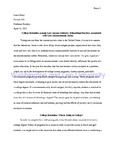| dc.rights.license | In Copyright | en_US |
| dc.creator | Berry, Laura M. | |
| dc.date.accessioned | 2013-11-06T12:35:02Z | |
| dc.date.available | 2013-11-06T12:35:02Z | |
| dc.date.created | 2013 | |
| dc.identifier | WLURG38_Berry_POV_2013_wm | |
| dc.identifier.uri | http://hdl.handle.net/11021/24067 | |
| dc.description | Laura M. Berry is a member of the Class of 2014 of Washington and Lee University. | en_US |
| dc.description | Capstone; [FULL-TEXT FREELY AVAILABLE ONLINE] | en_US |
| dc.description.abstract | Taking our cue from the current poverty rates in the United States, it is naive to assume that the American Dream is still alive. Many disadvantaged people, regardless of how hard they work and how well they live, confront nearly insurmountable barriers to upward movement on the socioeconomic ladder. Education, which has always been considered "the great equalizer," even seems to be falling short, as socioeconomic class almost directly influences the quality of a public education. In the past few decades, this fact has become widely accepted as a problem, which has led to the development of college access programs, charter schools, and skills development programs to help disadvantaged teenagers get into college. These programs have been largely successful at helping to gain access, but do not necessarily ensure the attainment of a college degree. If a socioeconomically disadvantaged, but fully capable, student is admitted to a college that is able to cover all financial costs of attending that college, why does that student have less of a chance of obtaining a degree? The answer goes far beyond numbers, manifesting in areas of cultural influence and self-esteem, proving that the effects of poverty are by no means exclusive to income. | en_US |
| dc.description.statementofresponsibility | Laura Berry | |
| dc.format.extent | 26 pages | en_US |
| dc.language.iso | en_US | en_US |
| dc.rights | This material is made available for use in research, teaching, and private study, pursuant to U.S. Copyright law. The user assumes full responsibility for any use of the materials, including but not limited to, infringement of copyright and publication rights of reproduced materials. Any materials used should be fully credited with the source. | en_US |
| dc.rights.uri | http://rightsstatements.org/vocab/InC/1.0/ | en_US |
| dc.subject.other | Washington and Lee University, Shepherd Poverty Program | en_US |
| dc.title | College Retention Among Low-Income Students: Educational Barriers Associated with Low Socioeconomic Status | en_US |
| dc.type | Text | en_US |
| dcterms.isPartOf | RG38 - Student Papers | |
| dc.rights.holder | Berry, Laura M. | |
| dc.subject.fast | College dropouts -- Prevention | en_US |
| dc.subject.fast | Poverty | en_US |
| dc.subject.fast | Self-esteem | en_US |
| dc.subject.fast | Education | en_US |
| local.department | Shepherd Poverty Program | en_US |
| local.scholarshiptype | Capstone | en_US |
